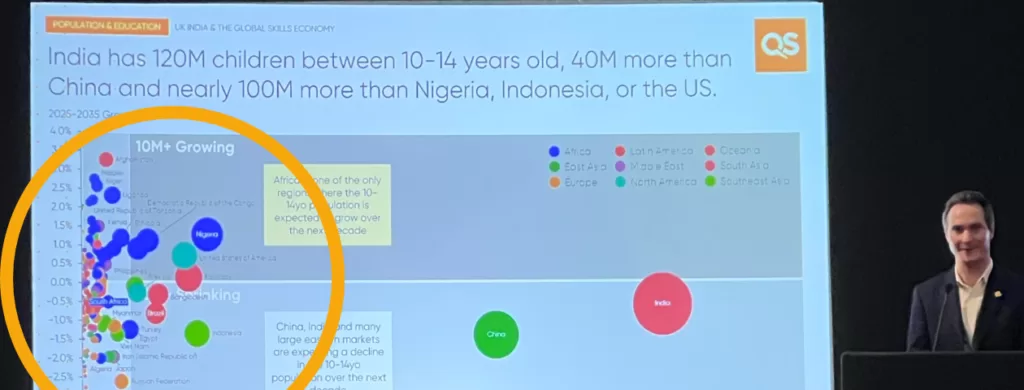
With the QS World University Rankings by Subject 2024 now live, Dr Ashwin Fernandes, QS Executive Director for Africa, Middle East & South Asia, takes a look at the newly collated data, and reflects on what this means for India’s future as a higher education destination.
India’s universities are on the rise.
In the recently released QS World University Rankings by Subject 2024, Indian higher education institutions have improved their rankings in the STEM subjects, Biological Sciences, and Business Studies. In fact, at least one Indian university is featured in 44 out of the 55 narrow subjects (vs 38 in 2023), as well as in all five broad subject areas, demonstrating its strong — and improving — global reputation.
Key takeaways from the QS World University Rankings by Subject 2024
69 Indian universities secured 454 entries, marking an impressive 19.4% increase from last year’s 355 entries.
The Institutes of Eminence (IoEs) lead the way with 47 of the 69 top-100 Indian positions. These results indicate that the IoE programme continues to drive improvement, which is reflected in university rankings. In fact, 82% of the IoE entries have either remained stable or climbed up in the rankings, underscoring the success of the initiative.
The IoE scheme is a significant initiative of the Indian government, conceptualised by the Ministry of Human Resource Development (now known as the Ministry of Education) in 2017. It aims to empower higher education institutions in India to become world-class teaching and research institutions.
Private universities flourish, and new fields of study emerge
The National Education Policy (NEP) 2020 largely helmed the positive changes that we see in higher education in India. The policy introduced a curriculum structure where students can gain knowledge as per their interests, and many programmes were introduced to provide skills to learners through high-quality education. In approving the NEP 2020, the Union Government, under Prime Minister Narendra Modi’s leadership, defined the vision for India’s new education system.
In this year’s QS World University Rankings by Subject, it’s clear that private universities are shining, particularly in helping students develop skillsets sought after by employers. Indian Institutes of Technology (IITs) are beacons of higher education and continue to develop brilliant minds and thinkers, year after year, with four of these premier institutions among the IoEs.
What is also heartening is the improvements among the research-centric fields of study, and India becoming a chosen destination for research. As you will recall, this was one of the key areas that the NEP 2020 addressed – research used to be under-funded in India, one of the reasons being bifurcation of higher education into teaching and research institutions.
In this year’s ranking, research is finally getting the attention it deserves. It is indicative of India rising to its full potential, given the solid foundation our education imparts in pure sciences and STEM subjects. The NEP’s push towards more research seems to have propelled more universities in India to embrace research and fund more initiatives.
India on a global ascent
In Asia, India has the second highest number of ranked universities, second only to China. With the year-on-year progress that we are seeing in subject rankings, India is poised to overtake China in a few years. Consider the following:
- India’s research output is the fourth highest in the world, just behind China, the United States, and the United Kingdom – and this is with just 18% the number of researchers China has and 5% that of the US.
- India overtook China in the overall institutions ranked in the 2024 edition of QS University Rankings: Asia.
This is hugely supported by some of the trends we have noticed in subjects discussed below.
India’s leaders
IIT Bombay ranked 95th in the world for Chemistry. India has never had a university in the top 100 for this subject, even though India has produced fine chemistry scientists and researchers. This rise in the rankings for chemistry stands testament to the potential India has in pursuing it as a field of study.
Famous Indian chemists include:
- C.N.R Rao, pre-eminent chemist who has honorary doctorates from over 80 universities and has authored over 1,800 research papers.
- Har Gobind Khorana, noteworthy biochemist who won the Nobel prize in 1968 for his work on nucleotides and their role in the synthesis of proteins.
- Sir Prafulla Chandra Ray, widely recognised as the Father of Indian Chemistry, was a genius chemist who envisioned a modern India.
IIT Madras ranks 44th in the world when it comes to aeronautical, mechanical, and manufacturing engineering. Why is this significant? 12 IIT Madras alumni were part of the Chandrayaan-3 mission.
Across all the QS World University Rankings by Subject 2024, 18 Indian universities rank in the top 100. IIT Bombay ranks in multiple subjects in that list, ranking 25th in Engineering – Mineral & Mining, but also claims the sixth position globally for employer reputation in this discipline.
India’s highest rank is 20th – secured by Jawaharlal Nehru University for Development Studies. The next highest ranked university is the Indian Institute of Management (IIM) – Ahmedabad, debuting in 22nd position for Business & Management Studies.
AI is of increasing interest to students. Coming to Artificial Intelligence, Indian Institute of Technology Bombay (IITB) ranks in the top 30 in the world for Data Science and AI studies. Under the visionary leadership of Amitabh Kant, the former CEO of NITI Aayog, a national strategy for AI was adopted in 2019, aiming to position India as a sector leader. Ever since then, India has launched many initiatives like Digital India and the Smart Cities Mission that harness the power of AI and data science in order to help states identify key projects involving these disciplines.
Rounding up this snapshot of the list of subjects is Law, where O.P. Jindal University achieved an all-time high ranking of 72nd place – the best in India. National Law School of India University ranked 151-200, University of Delhi ranked for the first time at 201-250 and Jawaharlal Nehru University ranked 301-350.
India leads G20 countries in QS subject rankings performance growth
In the QS World University Rankings by Subject 2024, 32% of the positions held by Indian universities improved year on year – the highest percentage growth of any G20 nation.
India performing well comparatively to G20 nations is a most encouraging trend. When the country hosted the 2023 G20 Summit, India led the way in several discussions on the global economy, being agents of change, promoting inclusivity, and embracing cultural diversity, centered around the notion of one world, one family. And under the leadership of Narendra Modi, education has been one of the key focal points of driving change not just in the country, but in the way the world perceives India.
India’s rich education legacy
All of the above points to India’s rich education legacy – and an exciting future. India has not just produced some of the world’s top minds in technology, science, and mathematics, it has also given the world some of the key concepts that keep the motor of the world running. Now, with the NEP 2020 and Indian universities rising in the QS World University Rankings by Subject, it’s clear that India is primed to take its place as a higher education destination and nurture the great minds of the future.
Private universities have taken on the onus of equipping the students of today who will be the workforce of tomorrow with skills and mindsets they need to be global citizens of the world. All these are imperative for India to continue to grow and become a chosen destination for higher education for both domestic and international students. And if this year’s QS World University Rankings by Subject are anything to go by, India is primed for its rightful place on the global map as a higher education destination.



